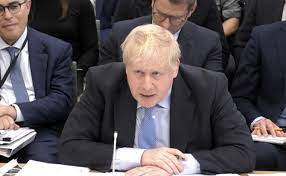Mohamed Chebaro
I watched and listened in disbelief last week to what Boris Johnson, the UK’s former prime minister and chief architect of “Brexit Britain,” had to say in front of Parliament’s privileges committee, which has been tasked with determining whether or not he deliberately misled the House of Commons, a grave offense for British politicians. If found guilty, Johnson risks losing his parliamentary seat, which would be a blow to his potential political comeback – a desire that is in step with what other offending politicians are doing around the world, from the US’ Donald Trump to Israel’s Benjamin Netanyahu, along with many others.
The problem with Johnson and politicians like him is the rising deficiency of accountability in the modern state system and the seeping impunity. These are facilitated more than ever by the unparalleled scale of erroneous information authorship, distribution and consumption in a fast-moving, often clickbait-led and driven world (but this may be a subject left for another article). At the end of his questioning, Johnson agreed that the committee was not a “kangaroo court,” as some of his allies had claimed. But he reserved his final judgment about its impartiality while the four Conservatives, two Labour and one Scottish National Party committee members consider whether or not to rule in his favor. “I will wait to see how you proceed with the evidence that you have,” he said. This reminded me of childish behavior, where the loser in a game bends all the rules and then goes on to question what is right and what is wrong. To my mind, Johnson looked defeated, and a loser on top of that, unable to manufacture the truth to defend himself, despite justifications from the likes of ex-Brexit Opportunities Minister Jacob Rees-Mogg, who referred to a so-called court of public opinion that had acquitted the former PM. Meanwhile, a YouGov poll showed that the majority of the UK public thinks Johnson is dishonest, while only 13 percent believe he is honest.
However, I am not sure he is finished yet, as some Conservative MPs have been quick to conclude. Caroline Nokes, for example, said that Johnson’s political comeback was “finished” after his grilling at the televised hearing, adding that, as far as she was concerned, “Boris Johnson is not coming back as prime minister.” I base my uncertainty on watching how ex-President Trump is still rattling America and how Netanyahu is sowing unprecedented divisions in Israel. This all goes to say that we are living in uncertain times, with plenty of space for the propagation of fake narratives at the expense of the factual and the misleading at the expense of the truth. The distorted seems easier on the ears of populists – and their fallacies that support often instinctive biases – at the expense of the more complex yet revelatory hard truths. From the days when he first chose to support Brexit, it was clear his ability lay in campaigning on the basis of many false claims, painting a rosy economic future for the country and its people outside of the EU family, free of immigrants invading British shores. However, recent numbers and realities have begun to reveal the scale of the damage done by Brexit. Office for Budget Responsibility Chairman Richard Hughes admitted this week that Britain is undergoing the “biggest squeeze on living standards we’ve faced in this country on record.” He said that Brits’ spending power will not recover to pre-pandemic levels for another half-decade. Hughes added that Brexit’s impact on the UK economy was of the same “magnitude” as the COVID-19 pandemic or the energy price crisis. He said he has “struggled to put it in any kind of sensible context,” saying that the UK’s gross domestic product will, “in the long run,” be 4 percent smaller than if the country had stayed in the EU.
Four percent could seem small to some, but in economic terms this is a colossal blow. Hughes said the UK’s economic growth has been held back by supply constraints related to labor shortages and stagnant investment since 2016. This was in line with estimates previously published by the Centre for European Reform, which found that Brexit cost the UK £33 billion ($40 billion) in lost trade in the second quarter of last year alone and more than £40 billion in tax losses in the year to the end of June 2022. The same research showed that the UK economy was 5.5 percent smaller in June last year than it would have been without Brexit. Leaving the EU has also cost British households more than £5.8 billion in higher supermarket bills, according to the Centre for Economic Performance. Of course, Brexiteers like Johnson have denied these figures have anything to do with them and Brexit or that the country needs an emergency strategic review to try to limit the damage caused by their misleading of the public, even if that would be in the nation’s long-term interest.
Therefore, I tend to agree that, despite the need for an investigation into whether or not he lied to Parliament and under oath to the privileges committee, it is difficult to see Johnson withering away from British public life. As his former boss at The Daily Telegraph Max Hastings has rightly said, it is not possible to write off Johnson “until he is buried at a crossroads with a stake driven through his heart.” So, the West should get used to the Johnsons, Trumps and others like them, as people everywhere are becoming more adept at exploiting the empty slogans of populism and its claims of easy fixes, compared to the hard and tough calls needed to govern properly and fix the many ills that have long riddled, poisoned and challenged human existence.







